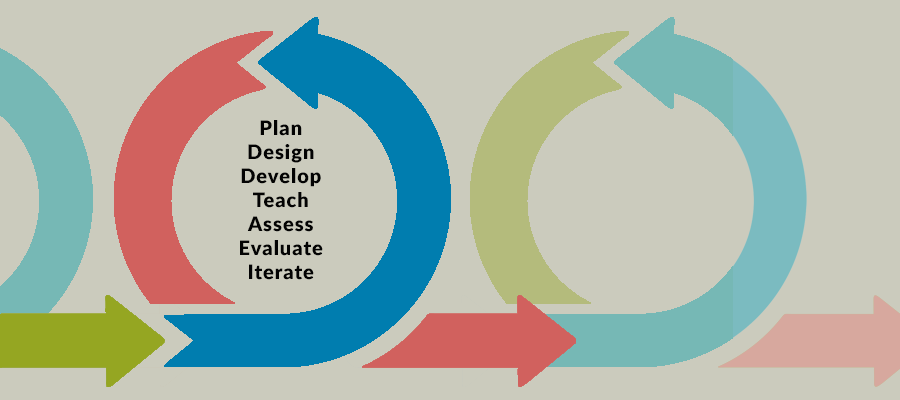
Teaching is an iterative process grounded in a cycle of design and redesign. The Rollins School of Public Health has developed and collected resources to guide faculty in the course evaluation and iteration process, with support from an engaged peer community including and beyond Emory. The goals of course evaluation and iteration are to improve learning experiences and:
- Encourage instructors to reflect on instructional practices and how they impact learning.
- Increase the use of evidence-based teaching practices across Rollins.
- Encourage/promote classroom assessment.
- Build community around the pursuit of teaching excellence.
- Ensure that each learner enrolled in our courses is respected, feels a sense of belonging, and is able to make a unique contribution to the course, our school, and our communities.
The course revision process can begin as soon as you start teaching your course and notice that adjustments are needed, learners are asking for frequent clarification on navigating course content or other course materials and activities. Certainly, if you solicit any formal (student course evaluations) or informal feedback (anonymous check-ins), these represent data to inform subsequent course revisions. It can be helpful to track potential updgrades in a spreadsheet throughout the semester and then apply to your course the next time you teach your course. Below are some general areas that you might consider:
Technical Issues and Documentation Review
- Review your Canvas course and identify any improvements in clarity, function, and student engagement.
- Check all procedural instructions for accuracy and gaps in logic.
- Review all content for grammatical errors and typos you may have missed before.
- Check for broken links in materials online.
- Update all the course dates and times for the next semester.
- Look for accessibility issues by using the checkers available in Canvas.
Pedagogical Elements
- Reflect on your own experience with teaching the course and complete the DEI Curriculum Assessment Tool
- Review student course evaluations
- What feedback can you address in terms of content, course organization, alignment of assessment with course content, learners engagement, inclusive environment?
- Review the flow of content
- Address gaps or content that may be discussed but not supported with resources or assignments.
- Refresh content with new articles or multimedia resources that are now available to keep the course fresh.
- Review overall alignment between learning objectives, assessments, and learning activities.
Briefly review other course components to maintain their quality
- Add relevant images in Canvas to improve the course appearance.
- Review course overview and introduction information.
- Review and review instructional materials as needed.
- Upgrade learning activities and learner interaction.
- Review utility and appropriateness of course technology
- Revise learner support and communication plans.

